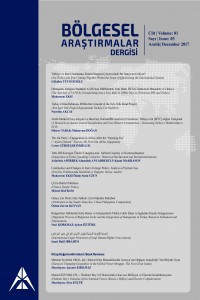BULGARİSTAN TÜRKLERİNİN GÖÇ SÜRECİ VE GÖÇMENLERİN TÜRKİYE’DEKİ İSKAN VE İŞ GÜCÜNE DAYALI ENTEGRASYONU
Abstract
9 Eylül 1944
tarihinde Sovyetler Birliği’nin Bulgaristan topraklarına girmesiyle, ülkedeki
faşist yönetim devrilerek yerini sosyalist rejime bırakmıştır. Rejimin
değişmesiyle birlikte bölgedeki Türk azınlıklar, bu süreçten son derece olumsuz
yönde etkilenmişlerdir. Komünist rejimin uygulanmaya başlandığı ilk yıllarda,
Bulgaristan’daki Türklerin desteği alınmak için eşitlikçi ve daha özgür
politikalar gerçekleştirilse de ilerleyen yıllarda Türkler aleyhinde ciddi
problemler ortaya çıkmıştır. Bu durum bölgede hayatını
sürdüren Türkleri bir kez daha göç etme düşüncesiyle karşı karşıya bırakmıştır.
Bu makalede Bulgaristan’daki komünist dönemin başlangıcından Yakın Akraba
Göçü’nün sonuna kadar olan süreçte, azınlıklara uygulanan asimilasyon
politikaları ve Türklerin anavatana göçü sırasında iskân ve işgücüne dayalı
entegrasyon süreci incelenmiştir.
References
- BAEV, Yordan-Nikolay Kotev, “İzselniçeskiyat Vıpros v Bılgaro-Turskite Otnoşeniya Sled Vtorata Svetovna Voyna (Vtora Chast)”, Mejdunarodni Otnoşeniya, Cilt 2, 1994.
- BÜCHSENSCHÜTZ, Ulrich, Maltsinstvenata Politika v Bılgariya: Politikata na BKP Kım Evrei, Romi, Pomatsi i Turtsi 1944-1989, çev. İvo Georgiev, Sofia, IMIR, 2000.
- ÇETİN, Turhan, “Bulgaristan’dan Göç Eden Soydaşlarımızın Sosyo-Ekonomik Özellikleri”, Erzurum Kültür ve Eğitim Vakfı (EKEV) Akademi Dergisi, Cilt: 13, Sayı: 39, Bahar 2009, s. 395-412.
- ÇOLAK, Filiz, “Bulgaristan Türklerinin Türkiye’ye Göç Hareketi (1950-1951)”, Tarih Okulu Dergisi, Sayı: 14, İlkbahar-Yaz 2013, s. 113-145.
- GEÇİKLİ, Recep Murat, “Bulgaristan Türkleri’nin Göçü (1950-1951) ve Abd Yardım Programına Yansıması”, Atatürk Dergisi, Cilt: 5, Sayı: 1, 2016, s. 1-38.
- GERAY, Cevat, “Türkiye’de Göçmen Hareketleri ve Göçmenlerin Yerleştirilmesi”, Amme İdaresi Dergisi, Cilt: 3, Sayı: 4, 1970, s. 8-36.
- HOCAOĞLU, Beycan, “Bulgaristan’dan Türkiye’ye Yönelik Göçler ve Göçmen Yerleşme Alanlarının Sosyo-Ekonomik ve Mekânsal Özellikleri”, Ege Üniversitesi Sosyal Bilimler Enstitüsü, İzmir 2011, (Yayınlanmamış Doktora Tezi).
- KOCADAŞ, Bekir, “Cumhuriyet Döneminde Yapılan İç ve Dış Göçlerin Toplumsal Etkileri”, Sosyolojik Düşün Dergisi, Cilt: 1, Sayı: 1, 2016, s. 11-18.
- ŞİMŞİR, Bilal N, Bulgaristan Türkleri: 1878-1985, Bilgi Yayınevi, Ankara 1986.
- TAHİR, Nuri Ali, “Bulgar Komünist Partisi ve Bulgaristan'daki Türklere Yönelik Asimilasyon Politikası”, Uluslararası Sosyal Araştırmalar Dergisi, Cilt: 8, Sayı: 41, 2015, s. 578-587.
- TAHİR, Nuri Ali, “1945 Sonrası Bulgaristan Türklerine Yönelik Asimilasyon Politikası”, Gazi Üniversitesi Sosyal Bilimler Enstitüsü, Ankara 2009, (Yayınlanmamış Yüksek Lisans Tezi).
- TSVETKOVA, Marina, “Bılgarskata Politika Kım Vızroditelniya Protses Sled 1944 Godina”, Mejdunarodni Otnoşeniya, Sayı 2, 2000, s. 79-89.
- YALIMOV, İbrahim, İstoriya na Turskata Obştnost v Bılgariya, İlinda-Evtimov EOOD, Sofia, 2002.
Migration Process of Bulgarian Turks And The Integration of The Immigrants in Turkey Based on Settlement And Employment
Abstract
On September 9th,
1944 with the entry of the Soviet Union in Bulgaria, fascist regime collapsed
and socialists came to the rule. With the change of the regime, Turkish
minorities living in the country were affected negatively. Despite positive
reforms initiated in the first years of the communist regime, the following years
showed that oppressive policies of communism will target their presence in
Bulgaria. Eventually, in the years following the end of the World War II, once
again, they became subject of forced migration. This article tackles the topic
of forced migration and assimilation among the Bulgarian Turks from the
beginning of communist period until the end of migration agreement based on the
unification of families and relatives. It also cover the settlement policies of
new immigrants in Turkey.
References
- BAEV, Yordan-Nikolay Kotev, “İzselniçeskiyat Vıpros v Bılgaro-Turskite Otnoşeniya Sled Vtorata Svetovna Voyna (Vtora Chast)”, Mejdunarodni Otnoşeniya, Cilt 2, 1994.
- BÜCHSENSCHÜTZ, Ulrich, Maltsinstvenata Politika v Bılgariya: Politikata na BKP Kım Evrei, Romi, Pomatsi i Turtsi 1944-1989, çev. İvo Georgiev, Sofia, IMIR, 2000.
- ÇETİN, Turhan, “Bulgaristan’dan Göç Eden Soydaşlarımızın Sosyo-Ekonomik Özellikleri”, Erzurum Kültür ve Eğitim Vakfı (EKEV) Akademi Dergisi, Cilt: 13, Sayı: 39, Bahar 2009, s. 395-412.
- ÇOLAK, Filiz, “Bulgaristan Türklerinin Türkiye’ye Göç Hareketi (1950-1951)”, Tarih Okulu Dergisi, Sayı: 14, İlkbahar-Yaz 2013, s. 113-145.
- GEÇİKLİ, Recep Murat, “Bulgaristan Türkleri’nin Göçü (1950-1951) ve Abd Yardım Programına Yansıması”, Atatürk Dergisi, Cilt: 5, Sayı: 1, 2016, s. 1-38.
- GERAY, Cevat, “Türkiye’de Göçmen Hareketleri ve Göçmenlerin Yerleştirilmesi”, Amme İdaresi Dergisi, Cilt: 3, Sayı: 4, 1970, s. 8-36.
- HOCAOĞLU, Beycan, “Bulgaristan’dan Türkiye’ye Yönelik Göçler ve Göçmen Yerleşme Alanlarının Sosyo-Ekonomik ve Mekânsal Özellikleri”, Ege Üniversitesi Sosyal Bilimler Enstitüsü, İzmir 2011, (Yayınlanmamış Doktora Tezi).
- KOCADAŞ, Bekir, “Cumhuriyet Döneminde Yapılan İç ve Dış Göçlerin Toplumsal Etkileri”, Sosyolojik Düşün Dergisi, Cilt: 1, Sayı: 1, 2016, s. 11-18.
- ŞİMŞİR, Bilal N, Bulgaristan Türkleri: 1878-1985, Bilgi Yayınevi, Ankara 1986.
- TAHİR, Nuri Ali, “Bulgar Komünist Partisi ve Bulgaristan'daki Türklere Yönelik Asimilasyon Politikası”, Uluslararası Sosyal Araştırmalar Dergisi, Cilt: 8, Sayı: 41, 2015, s. 578-587.
- TAHİR, Nuri Ali, “1945 Sonrası Bulgaristan Türklerine Yönelik Asimilasyon Politikası”, Gazi Üniversitesi Sosyal Bilimler Enstitüsü, Ankara 2009, (Yayınlanmamış Yüksek Lisans Tezi).
- TSVETKOVA, Marina, “Bılgarskata Politika Kım Vızroditelniya Protses Sled 1944 Godina”, Mejdunarodni Otnoşeniya, Sayı 2, 2000, s. 79-89.
- YALIMOV, İbrahim, İstoriya na Turskata Obştnost v Bılgariya, İlinda-Evtimov EOOD, Sofia, 2002.
Details
| Journal Section | Articles |
|---|---|
| Authors | |
| Publication Date | December 23, 2017 |
| Submission Date | December 16, 2017 |
| Published in Issue | Year 2017 Volume: 1 Issue: 3 |

